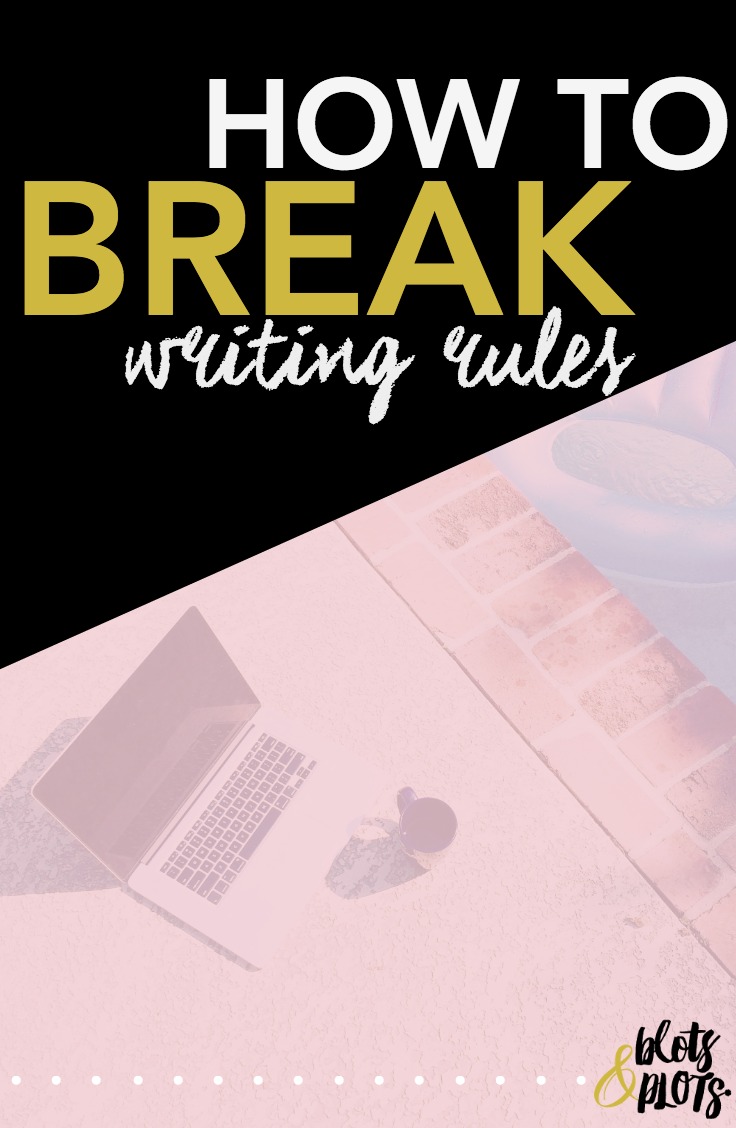Confession: I'm not a grammar nut.
I know the rules and aced my English courses, but that doesn't mean I have to like them. (I mean, really, can someone just make a definitive decision on the Oxford comma?)
For me, grammar is just a vehicle. A means to an end. (See what I did there? That wasn't a sentence. I don't care.) So how do we break writing rules and get away with it? Well, my friends, the great writers do it all the time.
Here's the secret: try new styles. Let me rattle off a list for you: Rainbow Rowell, George Saunders, Jonathan Tropper, William Faulkner, Kurt Vonnegut. These writers set their own style from subject matter to word choice to punctuation.
And guess what? People love them. Because they're interesting. Because they make no apologies. Here are the writing rules you should definitely consider breaking:
BREAK PLOT RULES
Happy endings are too predictable. Don't start your story with a prologue. Remember your story structure.There's a reason that there are writing rules. They work. Good old Joseph Campbell with his hero's journey. The snowflake method. The Three Act Structure.
These plot structures are tried and true (but often predictable). Am I saying to throw every rule out the window? Absolutely not.
There is no wrong way to write a story. Forget about plot point one, climax and denouement. Don't try to make your story fit a structure, if it so clearly doesn't. Let's get specific:
- Combine genres. I'm ridiculously intrigued with crossover novels. Fairytale meets dystopian. Classic retellings combined with zombie apocalypse. For my novel, These Are the Moments, I stuck with a simple new adult meets young adult genre.
- Bold endings. Worried about your cliffhanger? Scared to kill off your main character? Be bold, my friend!
- Pacing. Ditch the clinical structure. Add more action, less dialogue. Add less dialogue, more action. Do what works for your story.
Examples of breaking plot rules: Never Let Me Go by Kazuo Ishiguro, Miss Peregrine's Home for Peculiar Children by Ransom Riggs
BREAK PUNCTUATION RULES
Quotation marks are for dialogue. Yes, Oxford commas. No, Oxford commas. I happen to be a firm believer in the fragment-as-a-sentence trick. For emphasis. (See?) However, that doesn't mean I'm going to abandon all proper, well-crafted sentences.
When it comes to punctuation rule-breaking, a little goes a long way. Addendum: there are exceptions. Some novels or short stories are contingent on these off-kilter punctuation strategies.
Take Flowers for Algernon by Daniel Keyes. It's main character/narrator is a mentally challenged man who often misspells words and forgets commas. See what kind of punctuation fits your story, while still being readable.
Don't forget to vary your sentences. Unless you don't want to. Without all those cool clauses and prepositional phrases, your reader might get bored. Throw in a run-on sentence or two for good measure. (This is starting to sound more like a recipe than a blog post.)
BREAK STYLISTIC RULES
A paragraph is three-five sentences. Every story has a beginning, middle and end. Avoid slang. A writer's style is their brand. I'm fairly confident I could pick up a Jonathan Tropper book and recognize it.
That's why writers like James Patterson and Danielle Steel write so many books. They've found a genre/style that works for them, as well as a loyal audience.
CHALLENGE: don't stick to one genre. Embrace your writing style and then break away from it. Or don't. (Am I confusing you yet?) The thing about style is that it can't be forced, 96% of the time. (Totally made up statistic.)
Style is a unique trademark of a writer, because it's how that writer chooses to craft a story. Maybe you like to write in long, sweeping paragraphs. Maybe you like to write choppy, incomplete sentences. Maybe you like excessive setting. Maybe you avoid setting altogether. The more you write, the more your style reveals itself.
Personally, I try to write the way I speak. I want my novel to feel real and honest, true to life in all of its fun, sad and scary parts. Just keep writing. Always. (Gotcha again.)
Discussion Time: How do you break writing rules? What new breaks would you like to try?

